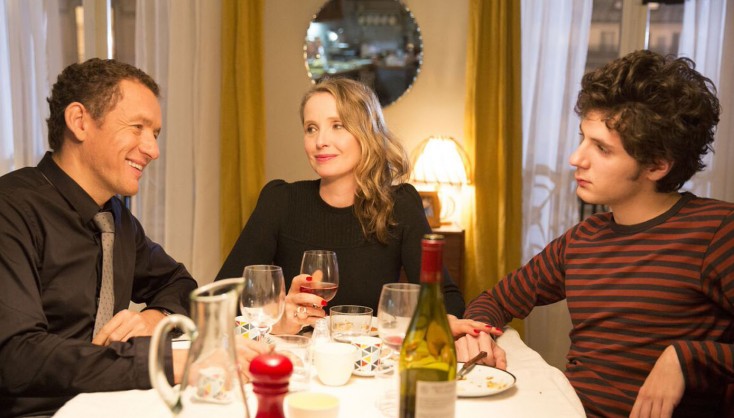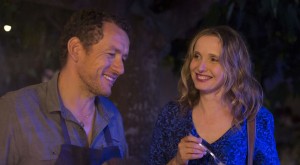By ANGELA DAWSON
Front Row Features
HOLLYWOOD—Growing up in France with parents who were both actors, Julie Delpy knew it could sometimes be a struggle as they waited for parts to come their way.
“They were depressed at times because they didn’t have work,” she recently recalled by phone. “It was scary as a kid seeing them depressed because of their jobs. They loved their job but sometimes they couldn’t find jobs. It was really awful.”
So at 16, the beautiful Parisian decided she would make a career out of telling her own stories as well as others. She wrote a screenplay, the first of many. When Richard Linklater auditioned her for his “Before Sunrise” romantic drama, she agreed to star in the film if she could make some adjustments to make it more meaningful. She and Linklater earned Oscar nominations for their screenplay for 2005’s “Before Sunset,” and another for their 2014 follow up, “Before Midnight.”
Since making her feature directorial debut with 2002’s “Looking for Jimmy,” Delpy has directed and written five additional feature films, including her latest, the French-language comedy “Lolo.”
Delpy plays Violette, a fortysomething Parisian, with a glamorous career as a fashion show art director. She also is mother to a 19-year-old man-boy named Lolo, whom she has spoiled rotten. While Violette’s career is firmly on track, her love life is almost non-existent, marked by a series of disastrous romances. Violette hasn’t a clue that perhaps her son might have something to do with her failed relationships. When she embarks on a romance with Jean-Rene, a simple, kindhearted computer geek from the suburbs, Lolo resorts to his old reliable tricks to try and split them up.
The film stars Dany Boon as Jean-Rene, Karin Viard as her best friend and confidante Ariane and Vincent Lacoste as Lolo.
Having co-written the screenplay with Eugenie Grandval, Delpy, who has a 7-year-old son, said that while “Lolo” is a comedy, she was partly inspired by horror films from the 1950s.
Q: With some tweaking and different music, this could have been a horror movie.
Delpy: It is a comedy but the films that inspired me were films from the 1950s and early 1960s. There was one called “The Bad Seed,” about a little girl who destroys everything around her. I just like, and I showed in the film, (clips of) “Village of the Damned.” The idea is that the destruction is coming from the person that is closest to your heart. I just like the idea because it’s perverse in a way.
Yes, it’s funny, but it’s completely horrible, which I kind of like—this idea of comedy, but a little bit dark.
When people ask me what are my favorite comedies, I always say, “King of Comedy,” in which everyone is basically a narcissist or a sociopath. I remember seeing it as a kid and people weren’t sure what to think of it. So I love the dark side of comedy as well. I’ve done films that were funny and not so dark, but with this one, I wanted to go there.
I made (the antagonist) the son, but it could have been an ex-husband, a friend or co-worker. I just wanted to explore what a sociopath or narcissist could do to your life. It’s very insidious. It’s very dangerous. And, if you want, you can make it funny. Or you can make it terrifying. I thought for a moment if I should make it a nightmarish thing, but then I thought, because it’s the son, because it’s so crazy, it has to become a farce, so that’s what I did.
Q: You conceived the idea for this when you were pondering where you would be with your own child 15 years from now, because your son is only 7.
Delpy: Society has shifted. We used to have a formula—like mom and dad and the kids. The kids, even from my generation, I was different because my parents were artists and I was an only child so I was kind of like a child-king, sort of. They did everything for me. They loved me. They still do now.
Today, many families don’t have both the mother and father. There’s shared custody, but is shared custody exactly what’s needed. Is it what the child needs? It might not be what the child needs. It’s a big subject but here I’ve made it a comedy. Yes, she had her son and she gave him everything. Dad disappeared. And basically the son replaced the husband in her life, which is something I very far from in my own life. My new husband is my new husband and there’s no weird area where my son thinks he’s the man of the family.
Q: Can you talk about creating the character of Jean-Rene, because he isn’t sophisticated but he seems to truly love Violette?
Delpy: He’s the opposite of a Parisian man. Parisian men are very specific. They’re cool. I have to say I rarely dated Parisian men because they’re actually players. She’s been mishandled, poor Violette, and on top that her son has messed up everything. She’d probably been mishandled by a few Parisians. And then she meets this guy who’s a more genuine, sweet, romantic, simple—not in the sense of dumb—he’s simple person emotionally. He’s not perverse. He doesn’t play with women’s emotions. That’s why he becomes the perfect target for Lolo, who’s a complete perverse narcissist. He’s the opposite of someone who’s straightforward. Those people are so destructive.
Q: Are you like Violette in some ways?
Delpy: I’m a person who’s completely straightforward. I never make up stuff or twist around like a spider trying to build a web around people. I’m very naïve in a way. So when people like me meet complete destructive people, it’s very difficult because I don’t spot it right away. It’s very dangerous for people like me to be around a sociopath, who usually have no other talent other than their destructiveness.
Q: Can you talk about casting this film?
Delpy: The casting was very important. Vincent Lacoste, in real life, is actually the sweetest smartest young man I’ve ever met. He’s also a very good actor. When I worked with him on “The Skylab,” I thought to myself, “I’ve got to work with this guy again. He’s just fantastic.” So I wrote with him in mind. I also wrote the film with Dany Boon in mind, because he has this perfect, kind of sweet but not a pretty boy but adorable at the same time.
Q: The conversation Violette has with Karin Viard’s character in the Jacuzzi is pretty frank and graphic.
Delpy: Yeah, it’s pretty upfront on the subject (of sex). We had fun doing that. The part of Ariane I wrote for Karin, because not everybody can deliver those lines without being completely trashy.
Q: Do you think you could only make this film in France about a woman in her mid-40s going through a crisis with her teenage son like this? Do you think this film could get made in Hollywood?
Delpy: We’d have to find a fortysomething actress willing to play the mother of a teenage son. (She laughs.) I’m joking. But there are a lot of factors to it. People were surprised when I said I was going to play the mother of a 20-year-old. They said, “But you’re only 45.” And I said, “So what? I’m 45. What am I going to do? Pretend I’m 25?” It’s a silly concept. I think it’s okay to play my age and even older if I need to. I don’t mind that. A lot of actresses get nervous about that because it’s a very tough business. New people are coming in and they take the job of the actress that used to be the pretty actress. It depends on how you based your career. If you base your career on being a great actress or someone very funny, then I think it can go on forever. If you base your success on just beauty, it is going to be a very cruel business. If it’s based on your looks, then it’s going to go no matter what you do, it’s still going to go.
Q: Your career has evolved. You were an ingénue, and then you became a director and a writer. Did you want to become a filmmaker from the outset?
Delpy: I always wanted to be a director. I went to film school in 1992. I went to Tisch (School of the Arts) at NYU. It was always my goal. I wrote my first screenplay when I was 16. So directing has always been something I wanted to do. I didn’t start directing because I was afraid I wasn’t going to get parts as a 40-year-old actress. I never thought of that. I just thought of making my films. I just happened to be an actress. I feel more comfortable being who I am now than when I was 20 and was this pretty little thing. I wasn’t super-happy. Apart from “Before Sunrise,” when the director (Richard Linklater) approached me and said, “Do you want to do this film?” and we rewrote it and put meaningful stuff in it that suddenly meant something to me, which was profound about relationships and love, then it made sense to be my age and make a film. I remember that my agent got mad at me because I didn’t show up for an audition for “Rush Hour 2,” to play a sexy Latina. I was like, “Why should I go in? I’m writing a screenplay.” And they fired me. I remember, I was writing “Before Sunset,” which was the second film (in the trilogy), when I was supposed to go to that audition. And then I found out later, the (sexy Latina) role had already been cast. They just wanted to keep me busy. They often do that. And it was very disturbing. I was like, “You know what? This is not my life.”
Q: Having grown up in a show business family, did you feel prepared for the highs and lows of the career?
Delpy: Yeah. My parents are both actors. I have seen what they go through to be actors and to not be working and to be waiting for the part and waiting for people to want them to do something. It’s just very difficult. Emotionally, it’s very hard. So from the very beginning (of my career), I thought to myself, “I want to tell stories.” Little comedies, whatever it is, I want to tell stories.
I have great respect for actors and I forgive them a lot of their insecurities because I’ve seen what happened to my parents.
Q: Is there something you’re writing or developing now?
Delpy: My next film is a drama that I’m going to shoot in England, probably. I tried to set it up in L.A. and it didn’t work out. Originally, it was going to be shot in London, so I’m going back and shooting it there.
Q: Do you have a title for it?
Delpy: I don’t yet. Right now it’s called “Julie Delpy Drama.”






